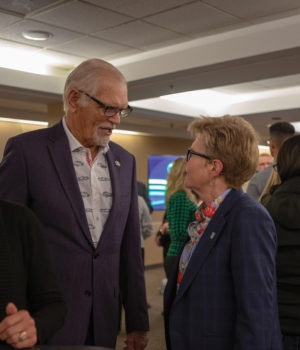
Jeff Melchior
No matter what point you are at in life, chances are, somewhere along the way you had a mentor. Be it a parent, teacher or that person at your first job who “showed you the ropes,” there was probably an individual who taught you how to function in a new and unfamiliar environment.
There’s a new focus on mentorship in agriculture today. Post-secondary ag schools and producer groups are connecting agriculture students with industry professionals to build the next generation of industry leaders. Underpinning many of these efforts is a goal to help people from all manner of disciplines and backgrounds find their place in the industry.
Two examples include Lethbridge College’s Agriculture Entrepreneur in Residence (AgENT) program and AdvancingAg—a partnership between the Alberta Wheat Commission (AWC) and Alberta Barley. Both efforts connect mentees with highly experienced ag professionals to help them achieve personal goals in the agriculture field or develop solutions to challenges within the industry.
Mentorship programs like these not only help students and entrepreneurs but the whole industry, says Kevin Bender, central Alberta farmer and AWC chair. “We want to provide our young people with opportunities for advancing in agriculture. It also serves our interests if we have people stepping up in the ranks that can fill positions being emptied by retiring people. Developing that talent helps us all.”
AGent program tackles local challenges
The AgENT program got its start with a $2.5 million donation from Cor Van Raay, a Lethbridge-area feedlot operator, to Lethbridge College. The gift was matched by the provincial government.
“The AgENT program is just one initiative the funding is being used for to advance agriculture-related education opportunities in our area,” says Megan Shapka, program coordinator of AgENT. “There’s a real focus on agribusiness-type activities.”
The goal of the program is to give students opportunities to develop solutions to several local agriculture industry challenges. These challenges were identified by nearby agricultural leaders in Shapka’s initial consultations—and they weren’t necessarily what she expected.
“A lot of the issues centered on communications—things like how we can increase consumer awareness of ag practices,” says Shapka. “They talked a lot about combating disinformation and misperceptions about agriculture practices.”
Other challenges include improving internet connectivity in rural environments and dealing with labour shortages.
Some of the on-the-ground training students experience under AgENT include workshops, field trips, special events and collaborative work sessions with mentors.
“Having these mentors on board allows us to test students’ ideas right away and that’s a really valuable experiential learning opportunity,” says Shapka.
“Through all this we’re hoping to foster some collaboration and turn these challenges into specific projects the students will work on. At the end of the year they’re going to pitch their innovative solutions back to industry in a competition, kind of like a Dragon’s Den format.”
The breadth of the challenges identified is part of the reason the AgENT program is open to all Lethbridge College students. “That’s what’s really exciting about it,” says Shapka. “We’re really hoping to get cross-disciplinary participation. We’d like to bring together, for example, agriculture science students with business, engineering and information technology students who will all bring those different perspectives to a project.”
This diversity is reflected among the program mentors as well. “The people we’ve brought on board include entrepreneurs, business people, primary producers, economic development experts and tech experts,” she says. “I really think the students need people who’ve already been there. They need people who can engage them and help them see the relevance of building these skills.”
The AgENT program is still accepting new mentors. “I’m willing to keep that open throughout the whole year so we can keep adding to that pool of expertise,” says Shapka, who added that her expectations have been exceeded for student interest.
AdvancingAG pairs mentors and mentees
Now in its second year, the mission of the AdvancingAg program is to pair young agri-professionals with industry leaders who impart knowledge and help them design a roadmap for their careers. Bender says AWC has a mandate to help develop the next generation of producers and other agri-professionals.
AdvancingAg was designed with an eye towards fostering talent among young people with a variety of interests and backgrounds; primary production is just one of many disciplines under its umbrella.
“It can really be anything that’s related to agriculture,” says Bender. “It could be marketing, the crop protection products business, retail, even bank lending or agricultural lending—the sky’s the limit.”
Natasha Peiskar’s background and goals are examples of the diversity offered within the program; her post-secondary background is in chemistry, but her goal is to become a brewmaster. Paired with mentor Christine Spasoff, technical development lead for malt barley with Syngenta Canada, Peiskar’s goal is to have a working knowledge of the entire beer production chain from malt barley farm production to the malting process to the consumer experience—all with an eye towards identifying new opportunities in the brewing space.
Peiskar already knows quite a bit about brewing. She is currently the head brewer for Last Best Brewing & Distilling in Calgary. “I’ve been participating in the Cicerone—which is basically a sommelier for beer— program and through that program you have to know everything from the ingredients all the way to the packaged product. I thought the AdvancingAg program would be a great opportunity to expand my knowledge.”
She says she would like to create a dialogue between malt barley farmers, maltsters, brewers and end-users. “There are so many different things we can do with the different varieties of malt barley being malted right here in Alberta. I can see potential for some really fun collaborations, maybe even starting a new beer with a new flavour profile with some of the new malt barley varieties we see in the field.”
Spasoff met Peiskar a week before they were paired as mentor/mentee at the AdvancingAg yearly July kickoff and was immediately struck by her enthusiasm. “She was thrilled that day,” says Spasoff. “She was just excited because she was in a barley field. We talked about farm trials, about barley and how it grows and how farmers treat it.”
One of the most satisfying parts of the program for Spasoff has been the opportunity to connect Peiskar to multiple industry leaders and watch her build a network. “My passion at work is networking and finding people who can help you find what you need,” she says. “Growing that network is equally as important as growing the knowledge.”
Spasoff says in some ways she’s learning just as much about the malting and brewing industry as Peiskar. “I kind of look at it as a mentee-mentee or mentor-mentor relationship. I joke that I don’t know who is who so it’s kind of a learning opportunity for me as well.”
One of Peiskar’s favourite parts of the program since starting in July has been working with Spasoff. “She’s such an engaging mentor and she’s so well-connected in the industry. We have been able to go to quite a few events and I’ve been able to talk to quite a few cool people in the industry who are really excited to share their knowledge. On the ag side of things everyone has been so welcoming.”










